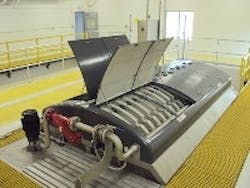Retrofitting Traveling Bridge Filters
Glendale Heights Wastewater Treatment Plant discharges treated water to the East Branch of the DuPage River in Illinois. Local discharge requirements state that the total suspended solids (TSS) discharging from the plant must be 5 mg/L or less. To remove TSS and meet this standard, Glendale Heights employed traveling bridge filters for tertiary treatment. Frequent problems with these filters included: bridge derailment, sand migration, inconsistency during high flows and permanent biological fouling.
With an aging system, Glendale Heights needed to upgrade its tertiary treatment to continue to meet the TSS effluent standard. To minimize construction and operational costs, Glendale Heights established the design objective to use existing basins and maintain the current gravity fed system.
Finding the Right Fit
Maintaining the same hydraulic profile allowed Glendale Heights to minimize operating costs because water did not
require repumping. While multiple technologies were studied, many were eliminated due to their inability to match the existing hydraulic profile.
Glendale Heights wanted to upgrade its system and increase capacity with minimal modifications to its existing basins. Upon evaluation of available technologies, the engineer determined that a partially submerged disc filter was the only technology that could fit into the existing shallow basins as well as operate with a maximum of 11-in. head loss.
In order to improve the aging system and provide a more reliable effluent, Glendale Heights selected WesTech to provide three SuperDisc filters in 2011 because of their ability to meet the TSS regulation and fit into the existing hydraulic profile with minimal construction costs. The SuperDisc was customized to fit the existing hydraulic profile, requiring no additional pumping costs and saving money.
Disc filters are composed of multiple rotating filter discs with an absolute screen pore size. Water is fed into the system and flows by gravity into the filter discs where the suspended solids are then separated and accumulate on the surface of the filter fabric.
Rotating disc filters offers many advantages over traditional sand filters, including: more consistent effluent quality, simplified operations and maintenance, and a reduced footprint. The WesTech SuperDisc operates under these same principles with a simple, intuitive design, offering the distinct advantages of maximum performance and superior reliability.
With the installation of the SuperDisc filters, capacity remained the same, with the ability to increase as needed, and the footprint was reduced by 2,200 sq ft, 80%.
Winning Results
In addition to reducing the footprint, minimal construction was needed to retrofit the traveling bridge filters. With the new system, Glendale Heights is able to produce a high-quality, reliable effluent. TSS is removed from the system with 97% efficiency and meets the U.S. Environmental Protection Agency’s discharge permit.
Compared to sand filters and other rotating disc filters, maintenance is reduced and operational control is increased with the SuperDisc. Filter cassettes are easily replaceable with a minimal amount of down time.
The filter cassettes are made of a reinforced polyester composite frame resulting in a lighter, stronger cassette, and reducing installation and maintenance difficulties. These cassettes were also specifically designed to eliminate the potential for perimeter leakage by removing perimeter gaskets all together, as gaskets are typically weak points for possible leakage or failure.
By retrofitting the out-of-date traveling bridge filters with SuperDisc, Glendale Heights met all discharge requirements while minimizing operations and maintenance. WesTech has built a solid reputation for reliable process equipment and effective service worldwide.
